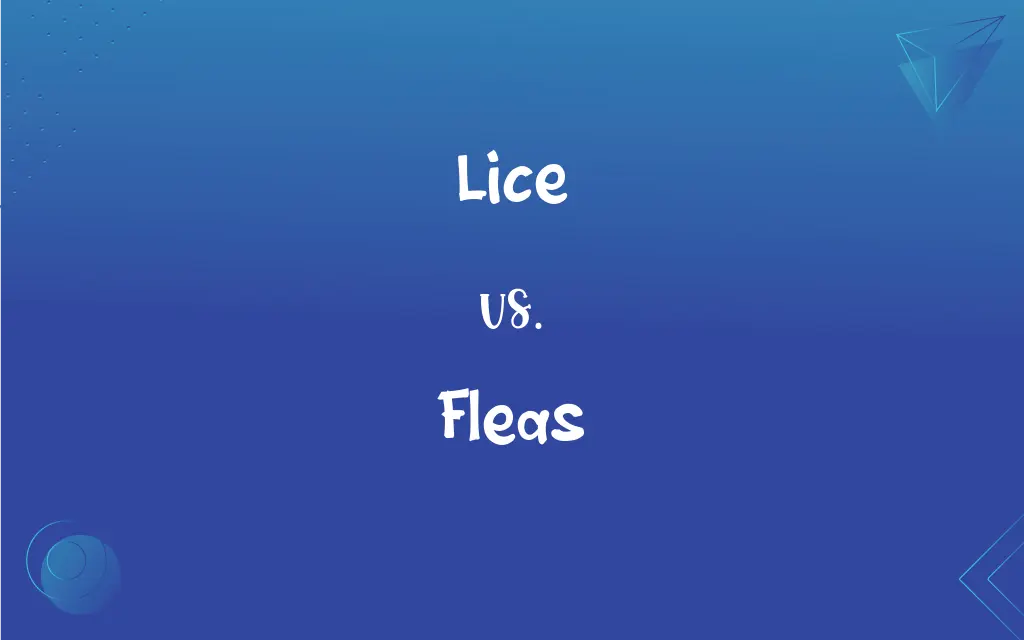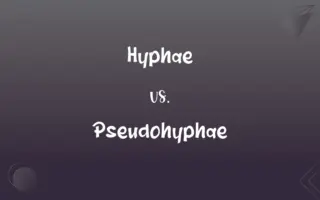Lice vs. Fleas: What's the Difference?
Edited by Aimie Carlson || By Harlon Moss || Updated on October 26, 2023
Lice are wingless parasites living on the skin; fleas are jumping insects often found on pets.

Key Differences
Lice and fleas are both common parasites, but they belong to different insect orders and have distinct life cycles. Lice are wingless insects from the order Phthiraptera and are typically found on the scalp, body, or pubic area of humans. Fleas, from the order Siphonaptera, are also wingless but are known for their exceptional jumping ability and primarily infest pets like dogs and cats, although they can also bite humans. While lice spend their entire lifecycle on the host, fleas can jump between hosts and are not confined to living on a single individual.
In terms of physical appearance, lice and fleas exhibit notable differences. Lice are small, flat, and have a greyish-white or tan color, making them sometimes difficult to spot in hair. Fleas are darker, usually reddish-brown, and their bodies are laterally compressed, allowing them to move easily through an animal’s fur. Lice rely on their claw-like structures to cling to hair strands, whereas fleas are equipped with long hind legs that enable them to jump great distances relative to their size.
The feeding habits of lice and fleas vary considerably. Lice feed on human blood and require close contact with the host for survival; they can’t survive long off the human body. Fleas, on the other hand, also feed on blood but can go for longer periods without a meal and can survive in the environment away from the host. This difference in feeding habits reflects the distinct survival strategies of lice, which are more host-dependent, and fleas, which can persist in various environments.
Lice and fleas also differ in the way they reproduce and infest hosts. Lice lay their eggs, or nits, directly on hair shafts, where they remain until hatching. Fleas lay eggs on the host, but the eggs often fall off into the environment, such as carpets or bedding, where they develop into adults. This means that while lice infestations are usually contained to the host, flea infestations can spread throughout a household, making them more challenging to eradicate.
When it comes to health implications, lice and fleas can both cause discomfort but have different potential consequences. Lice infestations lead to itching and discomfort and, in severe cases, can cause sores from scratching. Fleas are notorious for causing allergic reactions in pets and can also transmit diseases like the bubonic plague and murine typhus. This highlights the importance of prompt and effective treatment for both lice and flea infestations, despite their differing impacts on health.
ADVERTISEMENT
Comparison Chart
Type
Parasites on human skin
Jumping insects, infest animals/humans
Mobility
Wingless, cannot jump
Known for jumping ability
Transmission
Close human contact
Jump from host to host
Health Impact
Itching, discomfort
Can transmit diseases
Preferred Hosts
Humans (head/body)
Animals, sometimes humans
ADVERTISEMENT
Lice and Fleas Definitions
Lice
Spread through close contact.
Lice can spread quickly in crowded places.
Fleas
Rapid breeders.
An infestation of fleas can happen quickly.
Lice
Cause itching and discomfort.
She used a special shampoo to get rid of the lice.
Fleas
Small, jumping insects.
Their dog brought fleas into the house.
Lice
Wingless parasites on humans.
The school had a lice outbreak.
Fleas
Parasites on animals and humans.
Fleas can cause discomfort to pets.
Lice
Found in hair and on the body.
He checked his child's head for lice.
Fleas
Can transmit diseases.
It's important to protect pets from fleas.
Lice
Visible to the naked eye.
The nurse identified lice on several students.
Fleas
Notorious for their bites.
Flea bites can be very itchy.
Lice
Plural of louse.
Fleas
Any of various small crustaceans that resemble or move like fleas, such as the water flea.
Fleas
Any of various small, wingless, bloodsucking insects of the order Siphonaptera that are parasitic on mammals and birds and can jump long distances.
Fleas
Plural of flea
Fleas
Infl of flea
FAQs
Can fleas live on humans?
Fleas prefer animals but can bite and live on humans temporarily.
What are fleas?
Fleas are small, jumping insects that feed on blood from animals or humans.
What are lice?
Lice are tiny, wingless parasites that live on humans.
What environments do lice thrive in?
Lice thrive in warm, close-contact environments.
How can fleas be prevented?
Regular treatment of pets and cleaning of living spaces can prevent flea infestations.
How do you treat lice?
Lice can be treated with medicated shampoos and combing out nits.
Can lice infestations cause other health issues?
Persistent scratching from lice can lead to skin infections.
Can lice jump from person to person?
No, lice cannot jump; they spread through direct contact.
Are lice dangerous?
Lice are not dangerous but can cause discomfort and secondary infections from scratching.
How do lice spread?
Lice spread through direct contact with an infested person or their belongings.
What are the symptoms of lice?
Itching and visible lice or nits (lice eggs) in the hair are common symptoms.
What do flea bites look like?
Flea bites are small, red, and often appear in clusters.
How long can fleas live?
Fleas can live several months under optimal conditions.
Can lice survive off the human body?
Lice cannot survive long without a human host.
Are fleas visible to the naked eye?
Yes, fleas are small but visible to the naked eye.
Do all pets get fleas?
Most pets can get fleas, especially if not treated with flea prevention.
How fast do fleas reproduce?
Fleas can reproduce rapidly, with females laying up to 50 eggs a day.
Can fleas transmit diseases?
Fleas can transmit diseases like plague and typhus, though it's rare.
Can lice live on pets?
Human lice typically do not infest pets.
What attracts fleas to a host?
Fleas are attracted to warmth and carbon dioxide from breath.
About Author
Written by
Harlon MossHarlon is a seasoned quality moderator and accomplished content writer for Difference Wiki. An alumnus of the prestigious University of California, he earned his degree in Computer Science. Leveraging his academic background, Harlon brings a meticulous and informed perspective to his work, ensuring content accuracy and excellence.
Edited by
Aimie CarlsonAimie Carlson, holding a master's degree in English literature, is a fervent English language enthusiast. She lends her writing talents to Difference Wiki, a prominent website that specializes in comparisons, offering readers insightful analyses that both captivate and inform.































































